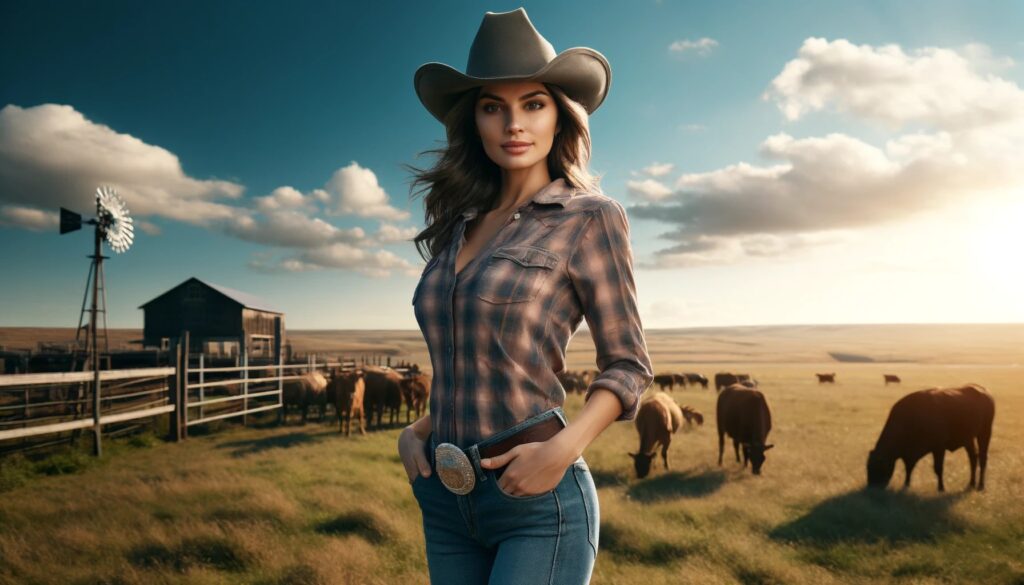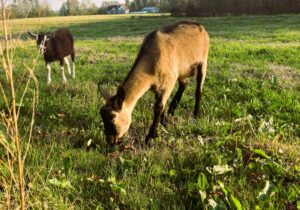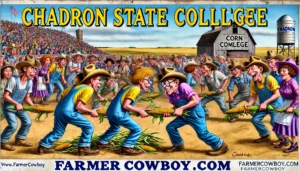
Pussycat Ranch A photorealistic wide aspect image of a female rancher in Texas standing in a vast field. She is wearing a cowboy hat a plaid shirt jeans and boots2.webp.jpeg
Introduction
The cattle ranching industry has long been a cornerstone of Kansas’ economy and cultural identity. Historically dominated by men, the industry is witnessing a significant shift as more women take on leadership roles in ranch management. Female cattle ranchers in Kansas bring a fresh perspective, innovative approaches, and a strong sense of community to the field. Their contributions are crucial for the sustainable growth and diversification of the industry. This essay explores the importance of female cattle ranchers in Kansas, highlighting their impact on the economy, their role in promoting sustainable practices, and the unique challenges they face and overcome.
Economic Impact
Driving Economic Growth
Female cattle ranchers play a vital role in driving economic growth in Kansas. According to the Kansas Department of Agriculture, the state ranks third in the nation for cattle and calves on farms, contributing significantly to the state’s economy. Women ranchers are key players in this sector, managing large-scale operations and contributing to the state’s agricultural output. Their involvement ensures a steady supply of high-quality beef, supporting local markets and export demands.
Diversification and Innovation
Women bring a unique perspective to ranching, often exploring diversified income streams and innovative practices. Female ranchers are more likely to engage in agritourism, offering farm stays, educational tours, and hands-on ranching experiences. This diversification not only supplements income but also educates the public about sustainable agriculture and the importance of cattle ranching. Additionally, women are often at the forefront of adopting new technologies and sustainable practices, which enhance productivity and environmental stewardship.
Promoting Sustainable Practices
Environmental Stewardship
Female cattle ranchers in Kansas are known for their strong commitment to environmental stewardship. They understand the intricate balance between livestock production and environmental conservation. Many female ranchers implement rotational grazing systems, which improve pasture health, reduce soil erosion, and enhance biodiversity. These practices ensure the long-term sustainability of the land, which is crucial for future generations.
Embracing Technology
Women in ranching are also leading the way in embracing technology to improve efficiency and sustainability. From GPS-guided equipment for precision farming to automated feeding systems, female ranchers leverage technology to enhance productivity while minimizing environmental impact. These innovations reduce labor costs, optimize resource use, and ensure better animal health and welfare.
Challenges and Overcoming Barriers
Gender Stereotypes and Bias
One of the significant challenges female cattle ranchers face is overcoming gender stereotypes and bias. The ranching industry has traditionally been male-dominated, and women often have to prove their competence and resilience in the face of skepticism. Despite these challenges, many female ranchers have demonstrated exceptional leadership and management skills, earning respect and recognition in the industry.
Access to Resources
Access to resources such as land, financing, and mentorship can be more challenging for women. Female ranchers may face difficulties in securing loans or purchasing land due to historical biases and a lack of tailored support systems. However, initiatives and organizations aimed at supporting women in agriculture are growing, providing essential resources and networking opportunities. Programs like the USDA’s Women in Agriculture initiative offer grants, loans, and educational resources specifically for female farmers and ranchers.
Building Strong Communities
Networking and Support
Female cattle ranchers in Kansas are instrumental in building strong, supportive communities. They often participate in or lead agricultural organizations, creating networks that provide mentorship, resources, and advocacy for women in agriculture. These networks are vital for sharing knowledge, solving problems, and fostering a sense of camaraderie among female ranchers.
Role Models and Mentors
Women in ranching serve as role models and mentors for the next generation. By sharing their experiences and expertise, they inspire young women to pursue careers in agriculture. This mentorship is crucial for cultivating a diverse and inclusive future for the industry. Programs like 4-H and FFA (Future Farmers of America) benefit significantly from the involvement of female ranchers who provide guidance and inspiration to young members.
Case Studies
Emma Johnson’s Sustainable Ranching
Emma Johnson, a third-generation rancher in central Kansas, has transformed her family’s ranch into a model of sustainability. By implementing rotational grazing, using solar-powered water systems, and adopting regenerative agriculture practices, Emma has improved the health of her land and livestock. Her ranch not only produces high-quality beef but also serves as an educational site for sustainable farming practices.
Sarah Martinez’s Community Outreach
Sarah Martinez manages a cattle ranch in western Kansas and is known for her extensive community outreach efforts. She regularly hosts workshops and farm tours, educating the public about the importance of sustainable cattle ranching. Sarah’s efforts have strengthened the connection between urban consumers and rural producers, fostering a greater appreciation for locally-sourced beef and the hard work of ranchers.
The Future of Female Ranching in Kansas
Increasing Female Representation
The future of cattle ranching in Kansas is bright, with increasing female representation and leadership. As more women enter the field, they bring diverse perspectives and innovative solutions to the challenges facing the industry. Supporting policies and initiatives that encourage female participation in agriculture is crucial for ensuring this positive trend continues.
Embracing Diversity and Inclusion
Embracing diversity and inclusion in the ranching industry will lead to more resilient and adaptable agricultural practices. Female ranchers in Kansas are already making significant strides in this direction, advocating for equal opportunities and resources. By continuing to promote diversity and inclusion, the industry can benefit from a broader range of skills, experiences, and ideas.
Practical Tips for Female Ranchers
Financial Management
Effective financial management is crucial for the success of any ranching operation. Female ranchers should seek out educational resources and workshops on budgeting, financial planning, and securing loans. Organizations like the Farm Service Agency (FSA) offer financial assistance programs specifically for women in agriculture.
Continuous Education
Staying informed about the latest developments in cattle ranching is essential. Female ranchers should take advantage of continuing education opportunities, such as workshops, seminars, and online courses offered by agricultural universities and extension programs. Keeping up with advancements in animal health, breeding techniques, and sustainable practices can significantly enhance ranch productivity and profitability.
Networking and Mentorship
Building a strong network of peers and mentors can provide invaluable support and guidance. Female ranchers should actively participate in agricultural organizations, attend industry events, and seek out mentorship opportunities. Networking with other ranchers can lead to valuable collaborations, knowledge sharing, and emotional support.
Balancing Work and Personal Life
Ranching is a demanding occupation, and balancing work and personal life can be challenging. Female ranchers should prioritize self-care and seek help when needed. Delegating tasks, hiring seasonal workers, and utilizing labor-saving technologies can help manage workload and reduce stress.
Conclusion
Female cattle ranchers in Kansas are essential to the state’s agricultural success and sustainability. Their contributions to the economy, commitment to sustainable practices, and ability to overcome challenges are inspiring and transformative. By fostering strong communities, advocating for diversity and inclusion, and continuing to innovate, female ranchers are shaping the future of cattle ranching in Kansas. Their legacy of resilience, leadership, and environmental stewardship ensures that Kansas remains a leader in the cattle ranching industry for generations to come.
Supporting and empowering female cattle ranchers is not only beneficial for the industry but also for the broader community. Their unique perspectives, dedication, and innovative approaches are vital for addressing the complex challenges of modern agriculture. By recognizing and celebrating the importance of female cattle ranchers, we can create a more inclusive, sustainable, and prosperous future for Kansas agriculture.
Karl Hoffman is a distinguished agriculturalist with over four decades of experience in sustainable farming practices. He holds a Ph.D. in Agronomy from Cornell University and has made significant contributions as a professor at Iowa State University. Hoffman’s groundbreaking research on integrated pest management and soil health has revolutionized modern agriculture. As a respected farm journalist, his column “Field Notes with Karl Hoffman” and his blog “The Modern Farmer” provide insightful, practical advice to a global audience. Hoffman’s work with the USDA and the United Nations FAO has enhanced food security worldwide. His awards include the USDA’s Distinguished Service Award and the World Food Prize, reflecting his profound impact on agriculture and sustainability.





